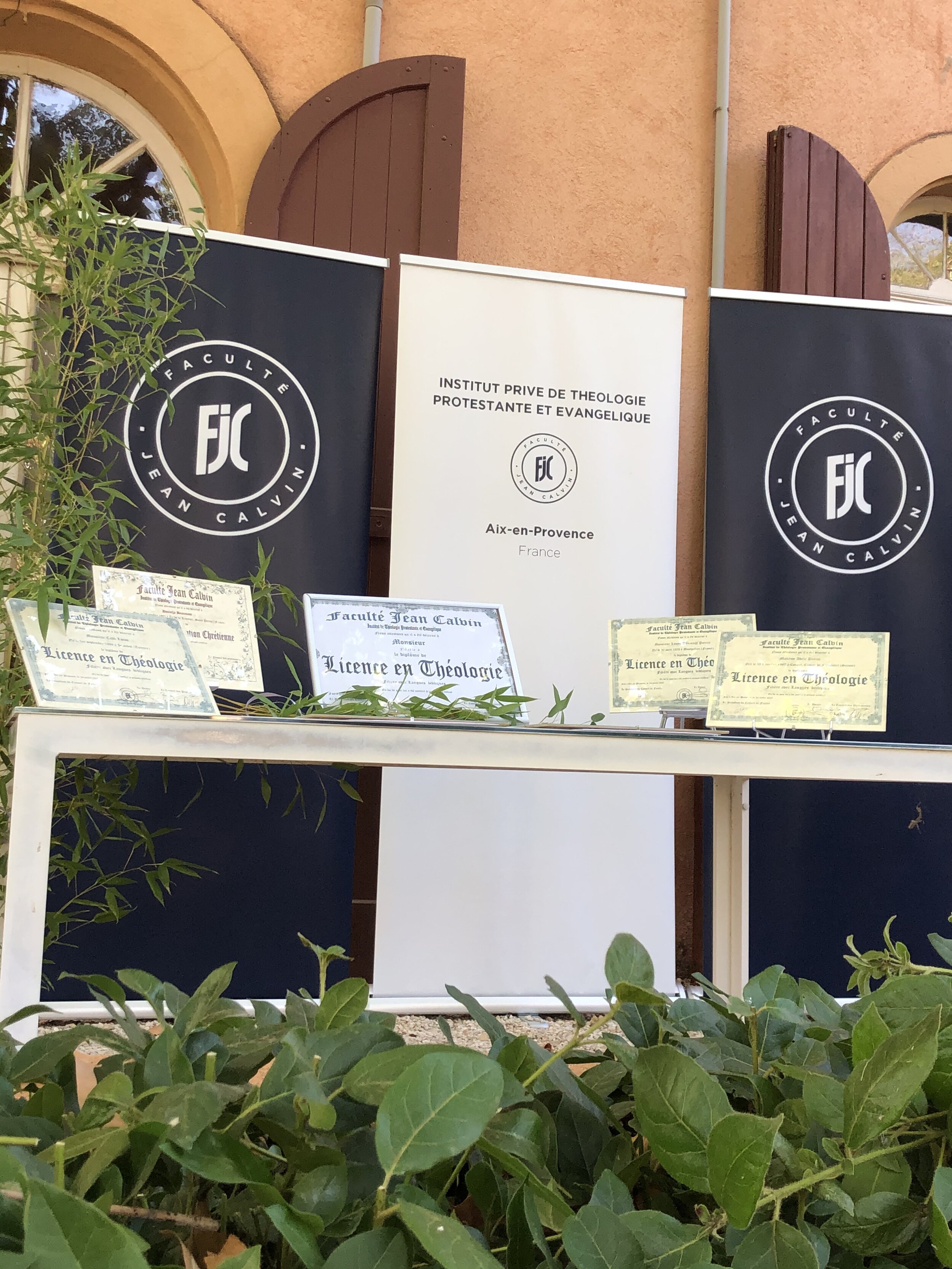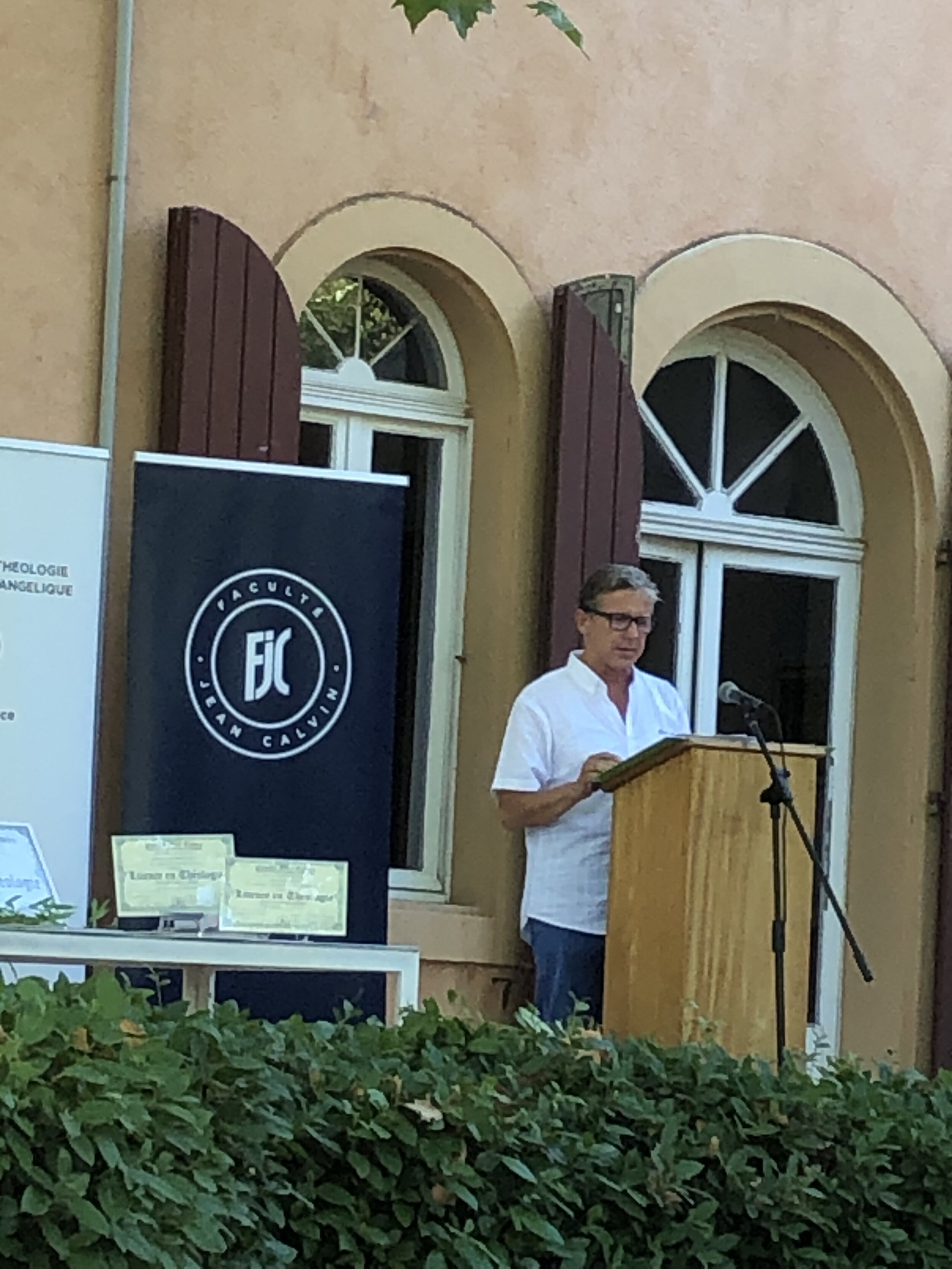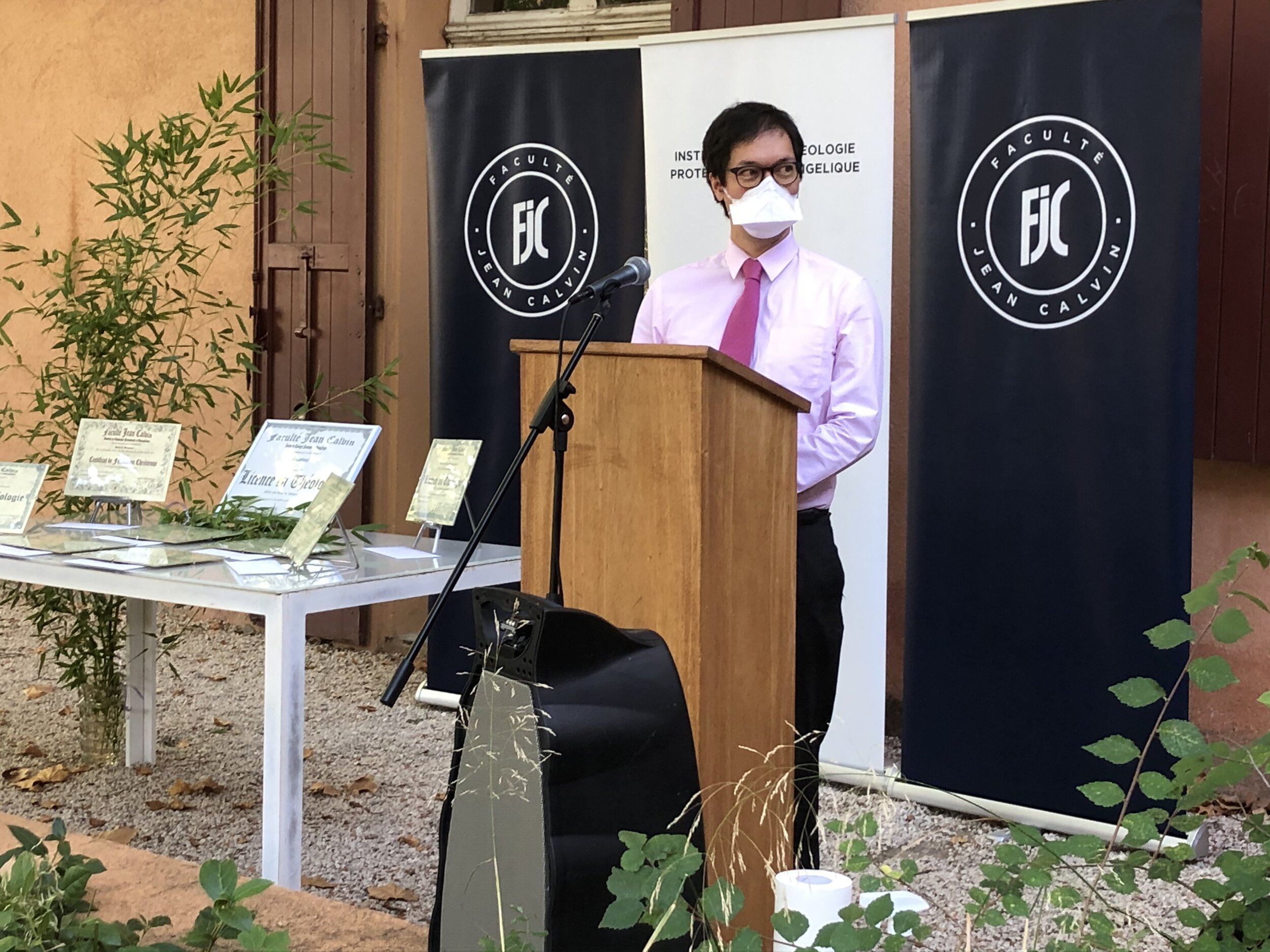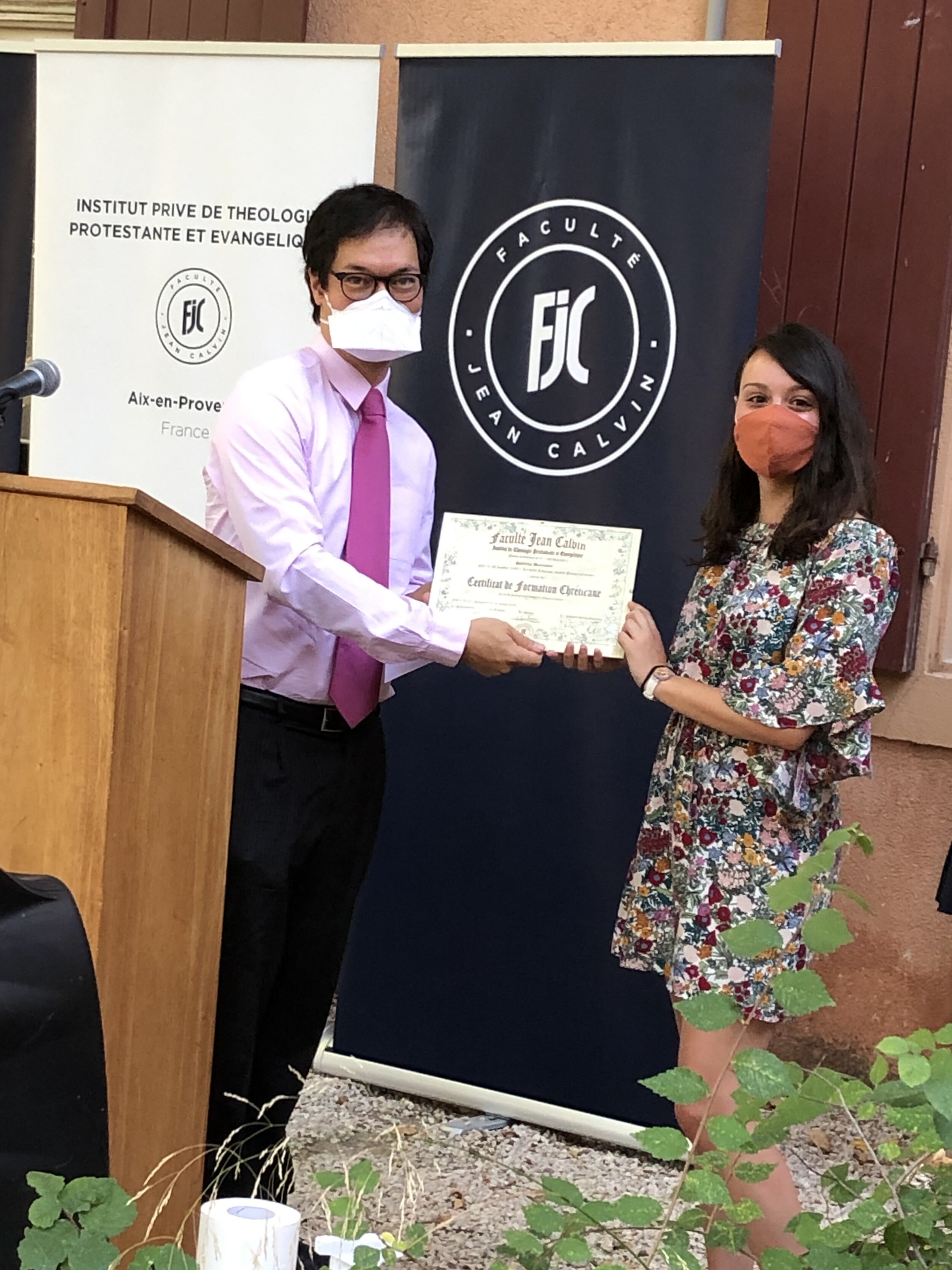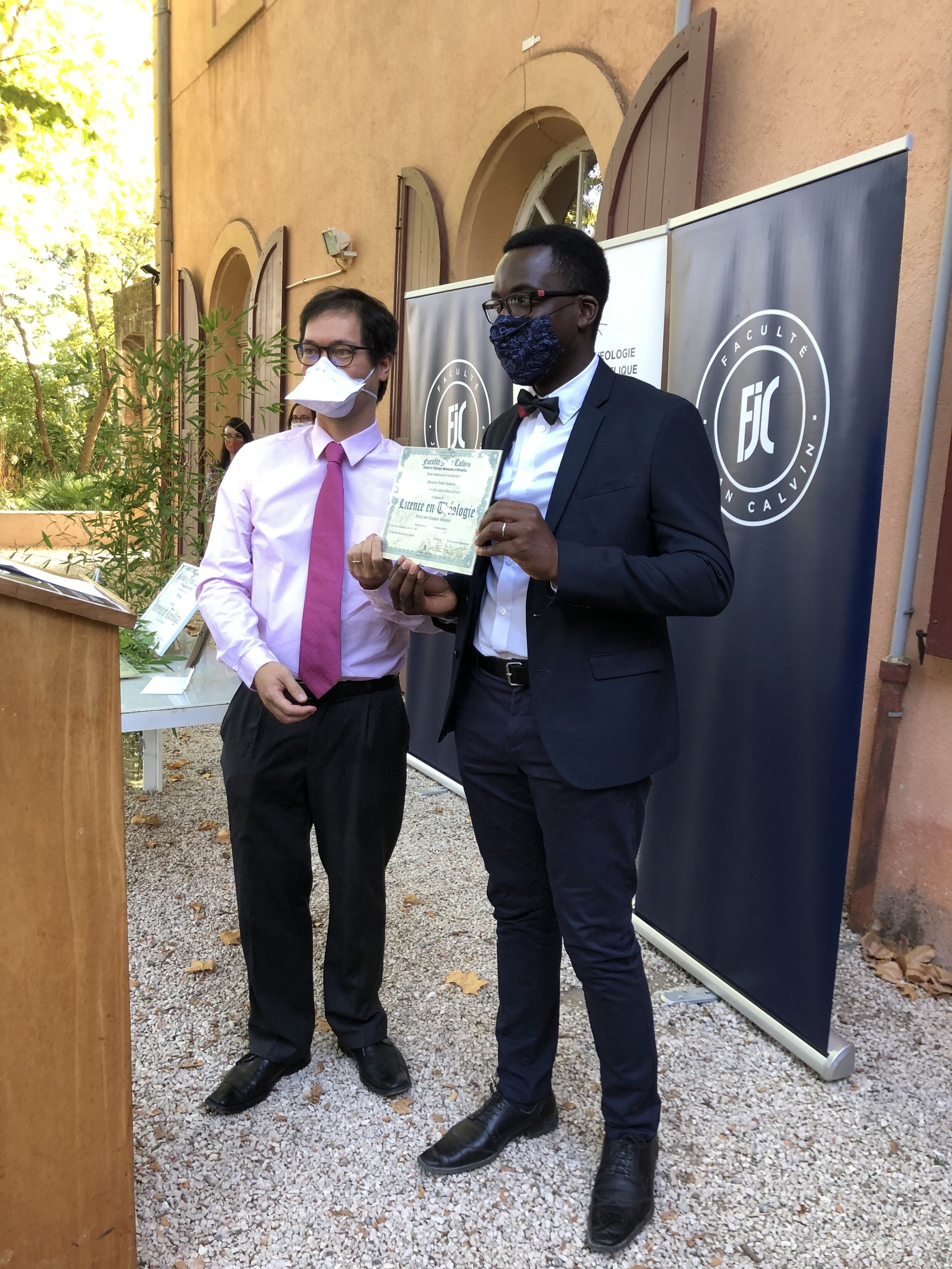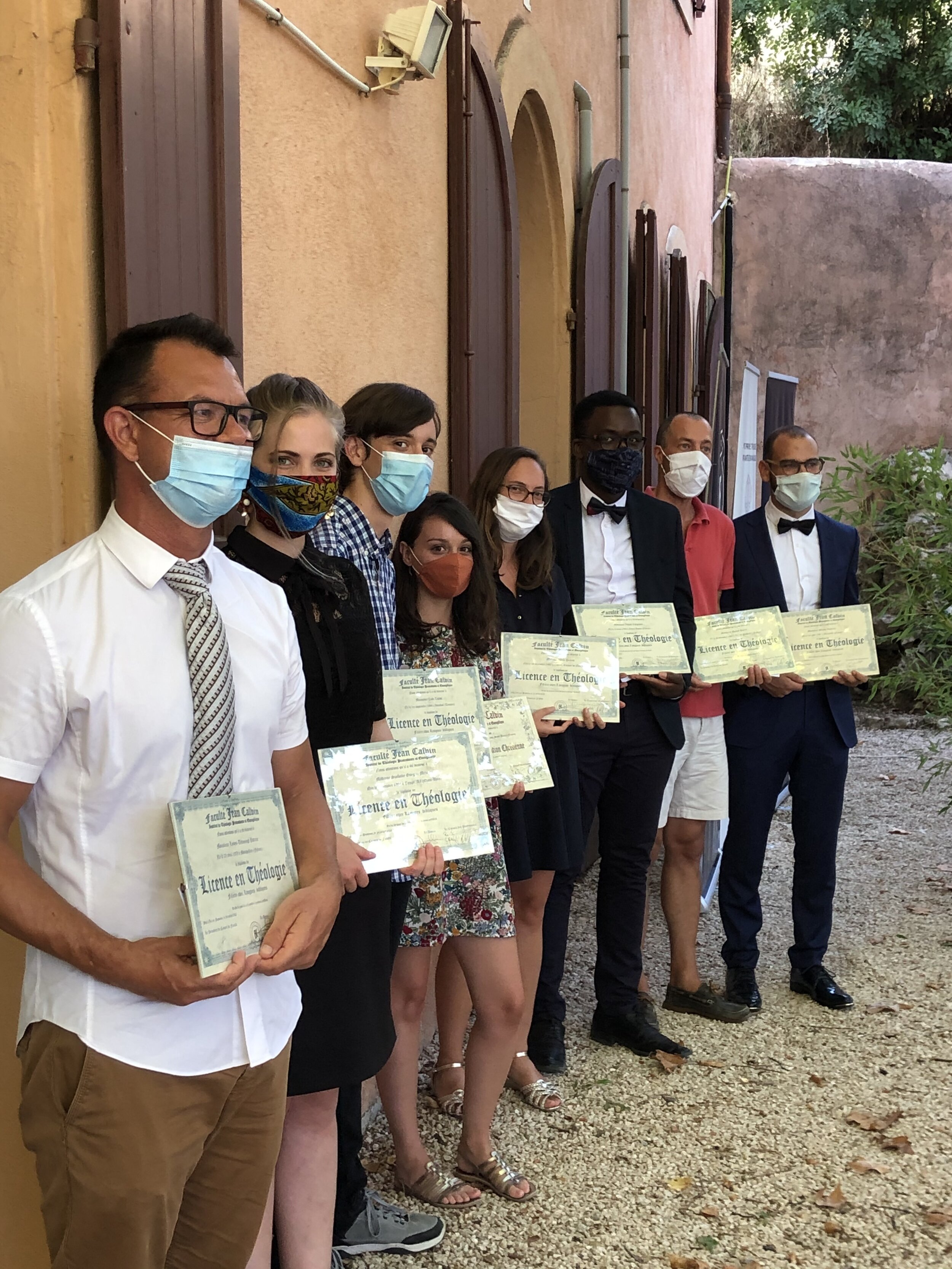Erin Imbert
Erin Imbert, Librarian at Faculté Jean Calvin
I grew up in a Christian home in the United States. While I attended a Baptist church during my childhood, I first encountered an explicitly reformed theology in high school, which provided the theological structure and consistent worldview that confirmed me in the faith and formed my Christian life. I studied business and economics in college and worked as an accountant for eight years. During that time I was asked to serve as treasurer for the Huguenot Fellowship, a non-profit organization in the U.S. that supports the Faculté Jean Calvin. Through my involvement with the Huguenot Fellowship I came to love the work of the Faculté and also, incidentally, met my husband, Professor Yannick Imbert. Prior to moving to France in 2016 I studied at Westminster Theological Seminary in Philadelphia. As a lover of both books and theology, I am delighted to serve as the new librarian at Faculté Jean Calvin. I look forward to welcoming friends of the Faculté to the library on their next visit.
Approach The Tragic Without Fear
Pierre Berthoud
On the occasion of the crisis caused by Covid-19, André Comte-Sponville shared with his listeners and readers some interesting thoughts on the panic, no doubt legitimate, caused by the pandemic. This anxiety has been largely exploited by health and political authorities (with a few exceptions) and amplified by the media. Beyond the issue of health, the philosopher argues that this fear crystallizes around death. It's as if our contemporaries suddenly discovered that they were mortal! The coronavirus forced them to face a reality that they sought to hide at all costs because they saw death as a failure. To reassure them, here is what Comte-Sponville says: “I have two pieces of news to share with you, one good and one bad: the bad one, we are all going to die; the good, the vast majority of us will die of something other than covid 19! He added, "Finitude, failure and obstacles are part of the human condition. Until we accept death, we will be distraught with every epidemic. To admit the reality of death is therefore to give oneself the means to appreciate life. This is how "we will love life because we will become more aware of its brevity, its fragility, its value. In other words, we have to make the most of human existence because there is nothing after death! Such awareness allows us, he says, to live more intensely while recognizing that health is only a "means to achieve happiness" and not an end in itself. Indeed, health is only a good, and can in no way take the place of "great values" such "justice, love, generosity, courage, freedom ...".
There is wisdom in the words of Comte-Sponville, his insistence on the preciousness of earthly life, on the limits and fragility of the human condition, on the values and ethical principles which give meaning and quality to existence. However, his approach gives the impression that he is indebted to the Judeo-Christian heritage while obscuring his philosophical and biblical roots. He bluntly rejects the existence of a sovereign and personal God to whom we are accountable and with whom we can have an intimate relationship. We are the only actors on the stage of this world and beyond its horizon there is nothing but nothingness. As for his acceptance of limits and obstacles, it is more akin to acknowledgment or resignation.
In contrast, the biblical perspective emphasizes the scandalous nature of death in a broken world. It is the ultimate enemy whose power is sin, understood as the rebellion against our ultimate face-to-face and his wisdom. It is precisely because the Bible distinguishes between the origin of being and of evil that sin, suffering and death are tragic. We can approach this tragedy without fear and with confidence because the Lord has turned the tide of history in Jesus Christ, his life, his death and his resurrection attest it! In it, we pass from death to the life which is embodied at the heart of our existence and which transcends the horizon of our world.
May the Holy Spirit give us wisdom in this restless, tottering, and crying world to be ambassadors of comfort, peace, and hope before which fear and anguish. faint. As "the Lord's steadfast love is better than life" it awakens in us confidence, peace, and praise (Ps 63.3).
Pierre Berthoud
President
Professor Emeritus
Faculté Jean Calvin
(translated)
Special Day of Prayer
Dear friends,
The particular and uncertain circumstances in which we are living, characterized by an increase in positive cases of Covid-19 and hospitalizations, the partial confinement extended to all of France and the latest abject terrorist attacks, arouse concern and disarray among the French population, including within the Christian community.
It seems to us that these ordeals, despite what our health and political authorities think, also have a spiritual dimension which goes beyond "health, daily bread and security" without however giving up on watching over and providing for them! Where to find the true meaning of life? Where to find tranquility in the midst of the anxieties of the moment? Where can we find the answer to the hideous grimaces of violence and death? Or find the courage to be messengers of comfort in the midst of anxiety, artisans of justice in the midst of the excesses of our society, of peace in the midst of present disarray, of a hope that transcends death?
To respond to these challenges which are beyond us, the members of the body of Jesus Christ, we have to engage in the fight of prayer which is at the heart of the Christian vocation. It is in this spirit that the Faculté team invites you to a day of prayer on Saturday, November 14, 2020. We invite you to choose a prayer time during that day, and to pray for the faculty, its students, and its needs.
This is urgent! It is essential to remind ourselves, and to share it with our contemporaries, that if the medical profession heals, if the body of Christ intercedes and testifies, it is indeed the Lord who heals, who gives new life and awakens, in those who trust in him, a hope that never deceives!
United in Christ, the living Lord, and in prayer,
Pierre Berthoud,
President
Professor Emeritus
Faculté Jean Calvin
15 Minutes
Paul D. Wolfe
15 minutes.
That’s how close they came to an unimaginable catastrophe.
On April 15, 2019, as the fire in Paris’ Notre Dame cathedral raged on, they were just 15 minutes away—maybe even 10—from a collapse within the building that probably would have meant its complete destruction.
That’s how close they came.
That’s what I learned a few nights ago when I watched the riveting documentary, “Notre Dame: Our Lady of Paris,” which chronicles the events of that awful day and night, when so much was lost, and so much was spared.
By just 10 or 15 minutes, the firefighters who bravely entered that glorious building in a desperate attempt to save it were able to control one particular area of flame that had nearly spread to the point that the cathedral would have been totally lost.
The documentary was simultaneously heartbreaking and thrilling. So much was lost that day, and they were close to losing the whole building. But they didn’t. Thanks to their skilled and noble efforts, much was spared, so that Notre Dame still stands on that site, and the work they’re doing now is that of restoration, and not rebuilding from scratch and memory.
What struck me as I watched that program was the revelation that heroic efforts had saved Notre Dame—efforts that few knew about at the time, carried out by men and women whose names almost nobody knows to this day.
Thinking now about the church (and not just a church building), isn’t that the way it often goes in God’s economy? Even now Jesus Christ is building his church—and in some cases preventing spiritual damage and destruction—by means of the unseen heroic efforts of relatively unknown dedicated servants.
And isn’t that what’s happening right now in Aix-en-Provence, at the Faculté Jean Calvin (FJC)? The men and women who serve at that seminary are not known widely to the world, and their efforts day after day to instruct and pastor and pray and manage the seminary will be known to very few in this life. But that’s exactly how Christ is building his church in France, and beyond. That’s exactly how Christ is training his present and future servants.
Thus it’s a privilege for us, as we give and pray and encourage, to know that we’re standing with them, and supporting them. No major television network is going to broadcast into millions of homes around the world a documentary about what’s going on at FJC. But I say, we don’t need them to. We walk by faith and not by sight. By faith we see glory that won’t see the light of day this side of heaven. And that’s why we stand with them. Dedicated servants. Heroic efforts. Day after day.
On September 13, FJC held an opening ceremony to launch the new semester, as well as hand out the diplomas from the past school year, which COVID-19 had sent online. The work of the seminary goes on, even in the strange and trying year that is 2020!
Yours in Christ,
Paul D. Wolfe, President
The Huguenot Fellowship
Rise of French Laïcité
William Edgar
Thoughts on Stephen Davis, Rise of French Laïcité
Huguenot Fellowship followers on our web site may be interested in a recent book describing the evolution of the current version of secularism in France. The book is by Stephen M. Davis, Rise of French Laïcité: French Secularism from the Reformation to the Twenty-first Century (Eugene: Pickwick, 2020). The author, Stephen Davis, has been a church planter in the US, in Romania and in France. He holds an earned doctorate from Columbia International University.
Laïcité means, roughly, the lay state. Why should we care about a uniquely French conjugation of secularity? For several reasons. The country of France has been a leader in so many ways. One of them is the manner in which it has faced the increasing challenge of immigration and the consequent diversity involved. Another is the openly admitted reality of two cultures, one the conservative (mostly Roman Catholic) willingness to have some sort of church-state alliance, and the other the hostility toward the church and its clergy.
Very well researched, the book begins with the Protestant Reformation and ends with the most recent developments in contemporary France. Davis ably describes two hard-fought milestones in the separation of “religion” from the public square. They are the laws of 1901 and 1905. The first is “the law of associations” whereby clerical influence was seriously curtailed. The second was a decisive disestablishment clause forbidding cults (worship groups) from having state support. The author notes that neither law succeeded in eradicating religion altogether, much to the disappointment of extremist secularists.
The presence of Islam comes up for special scrutiny. Debates flared up over religious garb, the hijab and the “burkini” in public places. The challenge was to forbid any sort of propaganda without alienating Catholics, with their earrings and necklaces. The final decision was to forbid “ostensible” garb.
The problem for many protestants, especially evangelicals, is for the general public not to confuse them with cults (les sectes). Fortunately allies such as the recognized scholar Sebasthian Fath, a French Baptist, have succeeded in making the proper clarifications. Our seminary is given honorable mention (p. 137), and president Pierre Berthoud is quoted. He underscores the need for a training ground that prepared leaders for a world in which a hostile version of salvation was offered.
Following Allen V. Koop, the author gently admonishes well-meaning American missionaries who come to France with good intentions, but with little idea of the complex history which has led to laïcité.
I am not aware of any comparable study in English of the rich, involved history of the march toward a unique version of secularity. The book ends with helpful suggestion for bringing the gospel to the French, with their aspirations and misconceptions.
William Edgar
Former President and Trustee
The Huguenot Fellowship
Opening Ceremony Photos
Dear Friends,
Our meeting last evening went very well. We were 70 people around the fountain in the garden of the Faculté, well spaced and masked. We were able to hand out the diplomas which we were unable to last June!
Blessings,
Kim Tran
Director
Faculté Jean Calvin
Jean-Raymond Stauffacher
Huguenot Fellowship Trustee, Ruth Ann Leduc, interviews Jean-Raymond Stauffacher, President of the Protestant Reformed Evangelical Church of France (Union Nationale des Églises Protestantes Réformées Évangéliques de France, UNEPREF).






